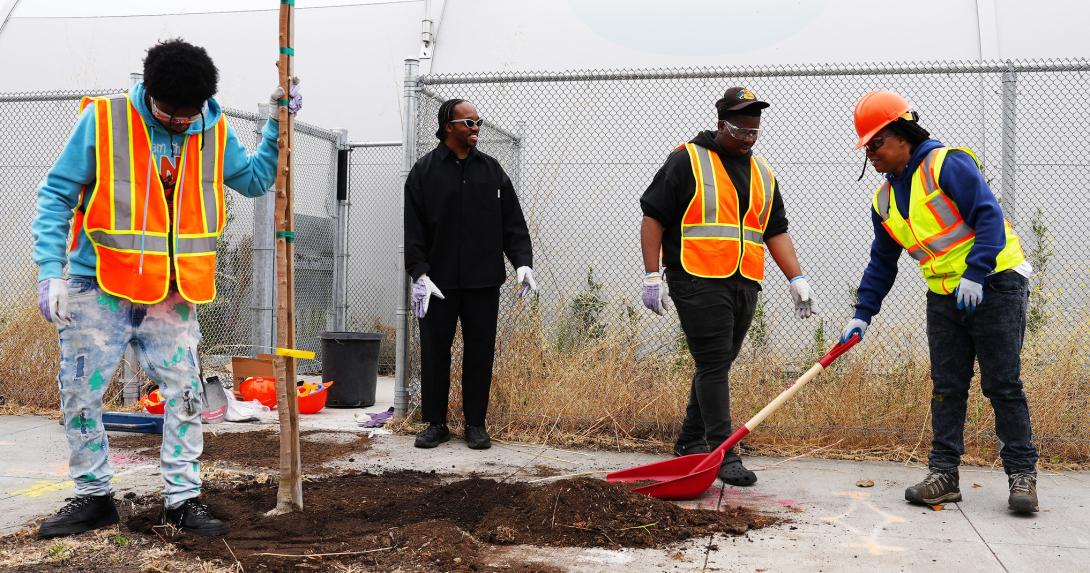
FOR IMMEDIATE RELEASE
Wednesday, September 20, 2023
Contact: Mayor’s Office of Communications, mayorspressoffice@sfgov.org
SAN FRANCISCO AWARDED $12 MILLION FEDERAL GRANT TO PLANT THOUSANDS OF NEW STREET TREES TO FIGHT CLIMATE CHANGE AND PROVIDE GREEN JOBS
San Francisco receives largest urban tree award in California from President Biden’s historic Inflation Reduction Act
San Francisco, CA – Today Mayor London L. Breed and interim Public Works Director Carla Short announced that San Francisco has been awarded $12 million in federal grant funding to plant and maintain trees, combat extreme heat and climate change, create green jobs and improve access to nature in the City – representing the largest single award among California recipients to grow urban tree canopies under President Biden’s Inflation Reduction Act.
The funding, provided by the U.S. Department of Agriculture’s Forest Service, is part of more than $1 billion in competitive grants awarded to expand urban tree canopies across the nation, particularly in low-income communities that bear the brunt of pollution from industry and vehicle emissions and have the smallest number of trees.
“This funding will help us strengthen our urban canopy, particularly in neighborhoods like the Bayview-Hunters Point, the Tenderloin and South of Market, which lack the benefits that street trees can bring,” said Mayor Breed. “I want to thank President Biden and our federal partners for investing in a greener future. Soon, the Public Works Bureau of Urban Forestry will plant and work together with neighbors and nonprofit partners to advance the health of our communities for generations to come.”
Communities in all 50 states, the District of Columbia, and several U.S. Territories and Tribal Nations are receiving funding, covered by the Justice40 Initiative and made possible by President Biden’s Inflation Reduction Act, passed last year.
“These investments arrive as cities across the country experience record-breaking heatwaves that have grave impacts on public health, energy consumption, and overall well-being,” said Agriculture Secretary Tom Vilsack, in announcing the grant recipients. “Thanks to President Biden’s Investing in America agenda, we are supporting communities in becoming more resilient to climate change and combatting extreme heat with the cooling effects of increased urban tree canopy, while also supporting employment opportunities and professional training that will strengthen local economies.”
The benefits of street trees in an urban environment are well documented – not only do they make neighborhoods more inviting, but they manage stormwater, reduce air pollution, improve human health, cool homes and streets, provide wildlife habitat and calm traffic.
San Francisco Public Works submitted its grant application, titled “Justice, Jobs and Trees: A San Francisco Climate Solution,” in June. The project will create approximately 100 new green jobs and workforce development positions by hiring and training residents from the City’s underserved communities to advance long-term employment, racial equity and social justice.
“We are thrilled to be selected in this highly competitive grant process,” said Carla Short, the Public Works Interim Director and a certified arborist. “We have the infrastructure in place and professional tree crews and nonprofit partners ready to get to work planting and caring for the new street trees in communities that need them the most.”
The grant announcement comes as Public Works is readying to open its new Street Tree Nursery located in the South of Market neighborhood on underutilized Caltrans land near Fifth and Bryant streets. Set to open this fall, the nursery will serve as a hub for the planting initiatives and workforce training that the federal funding will support.
While Public Works runs the StreetTreeSF program approved with overwhelming voter support in 2016 that sets aside $19 million annually for maintenance of the City’s 125,000-plus street trees, that local funding source is earmarked for tree maintenance, not planting trees.
Despite the success of the long-term tree maintenance StreetTreeSF program, which has been heralded as a model for urban forestry management in the United States, San Francisco has struggled to secure sustainable funding for tree planting, leaving thousands of potential tree- planting sites unused.
The Biden Administration’s grant award will bolster Public Works’ ability to support community partnerships with local nonprofit tree care organizations. In addition to the grant awarded to San Francisco Public Works, the City’s Recreation and Park Department received a $2 million Inflation Reduction Act grant for a tree canopy management plan for parks in the southeast part of the City.
“This historic investment in our City’s greenery, especially in the southeastern neighborhoods, is environmental justice in action,” said SF Rec and Park General Manager Phil Ginsburg. “Bringing more foliage to some of our most underserved communities will not only ensure that our parks remain a place of refuge and relaxation during excessive heat, but it will also provide more opportunities for residents through job creation, along with so many other environmental benefits.”
The U.S. Forest Service selected 385 grant proposals from entities working to increase equitable access to trees and nature, and the benefits they provide for cooling city streets, improving air quality and promoting food security, public health and safety.
San Francisco lags behind many large U.S. cities with one of the smallest urban tree canopies, with just 13.7% of the ground when viewed from above sheltered by the leaves and branches of trees. The national average is 27.1%. San Francisco’s tree canopy is also inequitably distributed among the City’s neighborhoods, with underserved census tracts having only about half the canopy at 8%, when compared with the 15% canopy coverage in other census tracts.
Studies show that trees in communities are associated with improved physical and mental health, lower average temperatures during extreme heat, increased food security and create new economic opportunities, the Forest Service noted. This historic funding will help the Forest Service support projects that increase tree cover in disadvantaged communities, provide equitable access to the benefits of nature and deliver tangible economic and ecological benefits to urban and Tribal communities across the country.
Grantees used the White House Council of Environmental Quality’s Climate and Economic Justice Screening Tool to help identify disadvantaged communities. This geospatial mapping tool identifies disadvantaged communities that face burdens in the categories of climate, energy, health, health, housing including nature deprivation, legacy pollution, transportation, water and wastewater, workforce development, as well as associated socioeconomic thresholds.
More information about the funded proposals, as well as announcements about the grant program, is available on the Urban and Community Forestry Program webpage.
Date
Type






